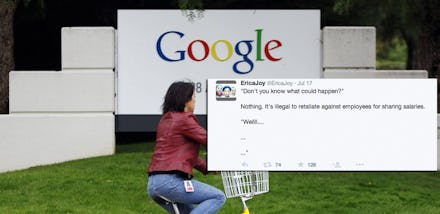No One at Google Was Talking About Pay Inequality — Until a Woman Made This Spreadsheet

Pay discussion is a well-known taboo in the professional world. No matter how close you may feel with your colleagues, no matter how many workplace dalliances or rivalries you confide in them, conversations about salary are usually reserved for the private offices of managers and HR representatives.
But one former Google employee has decided to talk about the time she decided to break that taboo.
Erica Baker, who currently works for the messaging client Slack as an engineer, took to Twitter on Friday to discuss what she said was a clear example of pay inequality perpetrated by her previous employer.
In a series of tweets, she described an experiment she conducted with a few coworkers in which they documented their salaries in a shared spreadsheet. After Baker confined it to the company's internal employee roster, the spreadsheet took off, and dozens of employees began adding their own salaries.
It highlighted, in her words, "not great things" when it came to pay discrepancies. But it also struck a chord with those who came across it, and it "became a thing," she tweeted.
Her bosses, however, were none too pleased.
Given that it's ostensibly illegal for an employer to stop employees from discussing their salaries amongst each other, there wasn't much Google could officially do.
But then she noticed that her peer bonuses — a Google perk that, according to Baker, allows colleagues to give each other a $150 prize for doing good work at the company — were disappearing.
One of her coworkers who had also been involved with the spreadsheet continued to receive his peer bonuses, which Baker saw as further evidence of discrimination:
She was also still getting negative feedback from higher ups at the company:
But in the end, according to Baker, the spreadsheet led to positive change — people who asked for fairer salaries got them.
This isn't the first time employees have attempted to bring salary discussions to the forefront. In May, to honor International Workers Day, programmer Lauren Voswinkel started the #talkpay Twitter hashtag, which encouraged people to publicly disclose how much they made, in the spirit of transparency and taboo breaking.
"If enough people get together to break a taboo on pay discussion ... individuals aren't usually singled out," Voswinkel told BuzzFeed at the time. "There's a voice in the back of my head that says, 'You could lose your job over this,'" she added. "But that fear solidifies the fact that this needs to happen."
Pay secrecy, it's argued, hurts those affected by the wage gap, as they don't have an opportunity to compare their salaries and thus remedy any disparities. Bringing the numbers out into the open, as Baker and Voswinkel attempted to do, creates a clear path for those who feel as though they're being underpaid.
Transparency, as former Reddit interim CEO and gender discrimination advocate Ellen Pao once said, is one of the keys to progress. "If we do not share our stories and shine a light on inequities, things will not change," she advised — and that means pay, too.
As Baker's spreadsheet experiment — the reins of which she passed along to someone else after she left Google — illustrated, things can change if the core issues are brought out into the open. (In an email to Mic, a Google spokeswoman declined to comment on Baker's case, noting that the company doesn't go into specifics when it comes to individual or former employees "because there's often a lot of nuance, private info, etc.")
Her tweets, Baker explained, were inspired by a Google Doodle of Ida B. Wells, a famous fighter for women's rights. But simply sharing a cutesy drawing of a historical figure isn't going to cut it — the company needs to walk the walk, too.
Read the full conversation on Storify here.